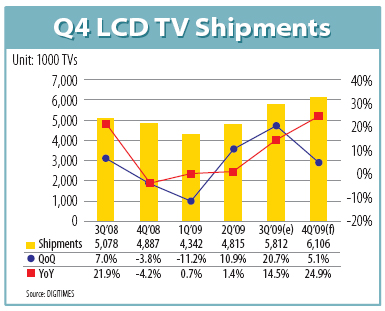Taiwanese TV and phone makers are expected to usher in a traditionally busy fourth quarter thanks to year-end holiday spending, with quarterly shipments of handsets and liquid-crystal-display (LCD) TVs to post growth from the third quarter, a report from Digitimes said.
Total shipments of handsets made by Taiwanese firms are expected to grow 12 percent from the third quarter to 18 million units, said the report released this month.
In the contract phone business market, US giant Motorola is still playing a main role as it releases major orders to local contract makers, with its shipments expected to account for about 20 percent of total Taiwanese volume in the current quarter, it said.

Meanwhile, sales of HTC Corp’s (宏達電) Android phones in the US market would be the key indicator of Taiwanese own brand shipment volume, it said.
“The launch of Microsoft Corp’s Windows Mobile 6.5 operating system last month didn’t really excite the market in terms of functionality and user interface,” the report said.
Therefore, HTC is expected to take advantage of the growing Android platform from Google Inc to make up for sagging sales of Windows Mobile smartphones.
HTC, the leading maker of smartphones running on both Android and Windows Mobile platforms, forecast a strong fourth quarter on Monday.
Revenues this quarter are expected to range between NT$40 billion (US$1.2 billion) to NT$42 billion, the highest of the year, with major US carriers promoting HTC phones for the Christmas season, HTC spokesman Cheng Hui-min (鄭慧明) said.
Meanwhile, Digitimes said fourth-quarter shipments of LCD TVs are expected to grow 5.1 percent from the third quarter to 6.11 million.
Brand vendors are widely expected to slash prices to promote TVs for the holiday season, thanks to an oversupply of panels, causing prices to drop.
TVs with 32-inch screens or larger would see a “significant price decrease,” with sales of such models to account for 57 percent of all shipments, the report said.
The top five contract makers, including Amtran Technology Co Ltd (瑞軒科技), TPV Technology Ltd (冠捷) and Compal Electronics Inc (仁寶電腦), are expected to command more than 90 percent of Taiwan’s total LCD TV production this quarter, it said.

Taiwan would remain in the same international network for carrying out cross-border payments and would not be marginalized on the world stage, despite jostling among international powers, central bank Governor Yang Chin-long (楊金龍) said yesterday. Yang made the remarks during a speech at an annual event organized by Financial Information Service Co (財金資訊), which oversees Taiwan’s banking, payment and settlement systems. “The US dollar will remain the world’s major cross-border payment tool, given its high liquidity, legality and safe-haven status,” Yang said. Russia is pushing for a new cross-border payment system and highlighted the issue during a BRICS summit in October. The existing system

Convenience store operator Lawson Inc has registered trademarks in Taiwan, sparking rumors that the Japanese chain is to enter the local market. The company on Aug. 30 filed trademarks for the names Lawson and Lawson Station, according to publicly available information from the Ministry of Economic Affairs’ Intellectual Property Office. The product categories on the application include some of Lawson’s top-selling items for use in the convenience store market. The discovery has led to speculation online that the popular Japanese chain is to enter the Taiwanese market. However, some pointed out that it might be a preemptive application to avoid others from co-opting the

Taiwan Semiconductor Manufacturing Co (TSMC, 台積電) is expected to grow its revenue by about 25 percent to a new record high next year, driven by robust demand for advanced technologies used in artificial intelligence (AI) applications and crypto mining, International Data Corp (IDC) said yesterday. That would see TSMC secure a 67 percent share of the world’s foundry market next year, from 64 percent this year, IDC senior semiconductor research manager Galen Zeng (曾冠瑋) predicted. In the broader foundry definition, TSMC would see its market share rise to 36 percent next year from 33 percent this year, he said. To address concerns

PROTECTIONISM: The tariffs would go into effect on Jan. 1 and are meant to protect the US’ clean energy sector from unfair Chinese practices, the US trade chief said US President Joe Biden’s administration plans to raise tariffs on solar wafers, polysilicon and some tungsten products from China to protect US clean energy businesses. The notice from the Office of US Trade Representative (USTR) said tariffs on Chinese-made solar wafers and polysilicon would rise to 50 percent from 25 percent and duties on certain tungsten products would increase from zero to 25 percent, effective on Jan. 1, following a review of Chinese trade practices under Section 301 of the US Trade Act of 1974. The decision followed a public comment period after the USTR said in September that it was considering